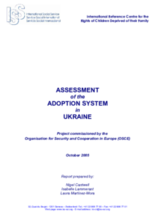This report by International Social Service (ISS) was commissioned by the Organisation for Security and Cooperation in Europe (OSCE). It responds to a request from the Minister for Youth and Sports of Ukraine in early 2005, who sought an assessment of the current legislation, mechanisms and practice regarding the adoption of Ukrainian children, against the background in particular of international standards and internationally-recognised principles in this sphere.
The report thus aims to identify the issues that need to be tackled within the overall context of child welfare and protection policy and practice in order for the adoption system in Ukraine to comply with international children’s rights and protection standards, and to propose legislative and other initiatives to that end.
On the basis of this assessment, the main findings are that:
• The child welfare system in Ukraine is much less oriented towards family preservation than towards providing out-of-home care for children who are deemed as not being, or who cannot be, looked after appropriately by their biological parents.
• This means that an unnecessarily large number of children are deprived of parental care and find themselves in alternative care situations.
• These alternative care situations still take the form of institutional placements rather than being family- and community-based.
• Whatever the kind of care provided, it is looked upon as a long-term response, adoption being virtually the only opportunity for leaving the care system since no attempt is made to reunite children with their parents or relatives once they are in care.
• At the same time, the primacy of domestic adoption is not ensured and, although it is not well-accepted in the population, efforts to promote and facilitate it are substantially inadequate.
• As a result, there is excessive reliance on adoption in its intercountry form, but this is not carried out according to internationally-accepted standards and, in its current state, it is open to widespread abuse spurred by opportunities for undue financial gain at various stages of the process.
• The absence of a professional matching process, and the consequent selection of children by the foreign prospective adoptive parents, is a major problem in itself as well as a cause of other key problems in this regard.
• The need to reform the intercountry adoption system is contested in many quarters that have an interest in maintaining the status quo, hence attempts to divert attention away from in-country problems and towards unfounded allegations of the post-adoption exploitation of Ukrainian children.
©International Social Service

